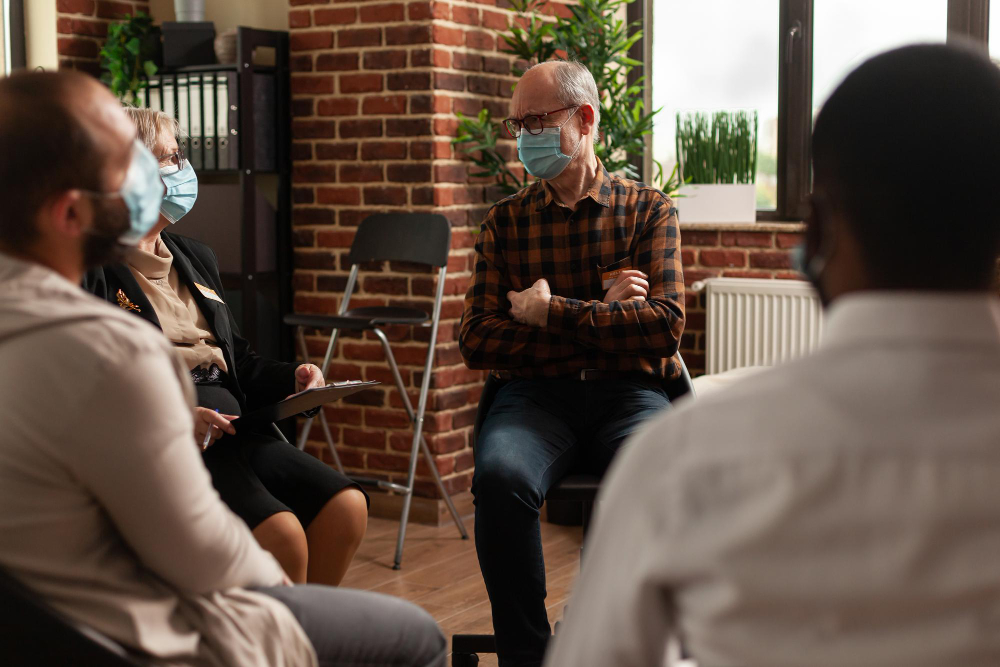Alcohol addiction affects every part of a person—physically, emotionally, mentally, and spiritually. That’s why successful recovery requires more than just one type of therapy. At Foundations Group Recovery Centers, we take a comprehensive, integrated approach that combines the best of both worlds: evidence-based clinical treatment and holistic healing practices.
By treating the whole person—not just the addiction—we help individuals uncover the root causes of their drinking, rebuild their self-worth, and create sustainable habits for a meaningful life in recovery. Through our Holistic Addiction Treatment Program in Massachusetts, clients benefit from a carefully designed blend of clinical and alternative therapies that support long-term transformation.
In this blog, we explore how Foundations uniquely merges clinical expertise with holistic care across all levels of our addiction treatment programs in Massachusetts.
Why an Integrated Approach Works Best
Alcohol addiction is more than a chemical dependency. It’s a deeply personal condition influenced by genetics, trauma, stress, emotional pain, and environmental factors. Addressing only the physical symptoms is not enough.
A dual-pronged approach is most effective because:
- Clinical therapies target the psychological and behavioral patterns behind addiction.
- Holistic therapies support physical healing, emotional release, and spiritual renewal.
- Together, they address the mind, body, and spirit—the core of whole-person recovery.
This combination is especially important for individuals transitioning from Alcohol & Drug Detox in Massachusetts, who need both structure and nurturing care as they begin to heal.
Clinical Methods at Foundations Group Recovery Centers
Our Addiction Treatment Center in Massachusetts uses industry-leading, evidence-based practices to support psychological healing and behavioral change. These methods are delivered by licensed therapists, medical professionals, and psychiatric providers.
Key Clinical Services Include:
1. Cognitive Behavioral Therapy (CBT)
- Helps clients identify and reframe destructive thought patterns
- Builds healthy coping mechanisms for stress and cravings
- Encourages goal-setting and problem-solving
2. Dialectical Behavior Therapy (DBT)
- Focuses on emotion regulation and mindfulness
- Effective for individuals with trauma or co-occurring mental health conditions
- Enhances interpersonal effectiveness and distress tolerance
3. Motivational Interviewing
- Encourages internal motivation for change
- Helps clients resolve ambivalence around sobriety
- Builds trust between clients and clinicians
4. Trauma-Informed Therapy
- Essential for clients with a history of abuse, neglect, or PTSD
- Reduces shame and reactivity
- Promotes safety and emotional healing
5. Medication-Assisted Treatment (MAT)
- Supports early recovery for those struggling with cravings or anxiety
- Administered under medical supervision
- Integrated with therapy for a well-rounded approach
These clinical tools form the backbone of our Day Treatment Programs in Massachusetts, as well as our Half Day and Outpatient Addiction Treatment services.
Holistic Methods That Support Mind-Body Healing
What sets Foundations apart is our strong commitment to holistic healing. We believe that sustainable sobriety involves restoring balance to the body and spirit—not just stopping alcohol use.
Our Holistic Addiction Treatment Program in Massachusetts is woven into every level of care, ensuring that clients receive:
- Physical wellness support
- Stress relief techniques
- Emotional expression outlets
- Spiritual exploration and self-discovery
Holistic Services Offered:
Yoga and Movement Therapy
- Promotes body awareness and grounding
- Reduces anxiety and tension
- Supports trauma recovery
Meditation and Breathwork
- Calms the nervous system
- Increases emotional regulation
- Helps manage cravings and intrusive thoughts
Nutrition and Wellness Counseling
- Repairs alcohol-related nutrient deficiencies
- Boosts mood and energy
- Teaches mindful eating and self-care routines
Expressive Arts Therapy (Art, Music, Journaling)
- Helps clients release emotions non-verbally
- Encourages creativity and emotional exploration
- Reduces resistance to talk therapy
Spiritual Support and Purpose-Focused Therapy
- Encourages identity building and reconnection with meaning
- Supports clients of all faiths and belief systems
- Facilitates personal growth and forgiveness
These modalities are tailored to each person’s needs, preferences, and recovery goals—and are available across all of our substance use treatment programs in Massachusetts.
How Clinical and Holistic Care Work Together
Foundations doesn’t treat holistic and clinical care as separate silos. Instead, we integrate them into a single, cohesive recovery plan that evolves with each client’s progress.
Here’s how integration works:
- A client may start the day with a CBT group, followed by yoga and meditation.
- Nutritional therapy may complement trauma processing by supporting physical energy and brain function.
- One-on-one therapy may focus on reframing thoughts, followed by an expressive arts session to release emotions.
By combining both approaches, clients build resilience, emotional agility, and self-awareness—giving them tools not just to recover, but to thrive.
Addressing the Brain-Body Disconnect in Recovery
Long-term alcohol use often creates a disconnect between mind and body, leading to poor emotional regulation, chronic stress, and physical health decline. At Foundations, our integrated model is designed to reconnect clients with their full selves.
Here’s how:
-
Clinical therapy (like CBT or DBT) helps retrain thought patterns and improve decision-making.
-
Holistic practices like yoga and body-based mindfulness restore physical self-awareness.
-
Nutritional support improves gut-brain connection, impacting mood and mental clarity.
This mind-body reconnection is essential in our Day Treatment Programs in Massachusetts, where clients begin practicing emotional intelligence and body attunement every day.
Customizing Holistic Care for Each Client
At Foundations, holistic care isn’t one-size-fits-all. Whether you prefer movement, mindfulness, creative expression, or quiet reflection, our treatment teams tailor your schedule to suit your needs.
Customization may include:
-
Trauma-sensitive yoga for clients with PTSD
-
Nutrition plans adjusted for diabetes or GI issues
-
Art therapy for clients uncomfortable with traditional talk therapy
-
Breathwork techniques for anxiety or panic
-
Spiritual counseling adapted to your background and beliefs
This individualized model ensures our Holistic Addiction Treatment Program in Massachusetts enhances—not overwhelms—your recovery journey.
Supporting Long-Term Growth with Integrated Aftercare
Recovery doesn’t stop when treatment ends. That’s why our aftercare plans continue to blend clinical guidance and holistic practices for lasting change.
Aftercare support includes:
-
Continued therapy sessions (virtual or in-person)
-
Access to holistic wellness groups and alumni meetups
-
Nutrition and exercise plans tailored to ongoing recovery
-
Meditation and journaling practices for daily grounding
-
Relapse prevention planning with real-world coping tools
Clients stepping down to Outpatient Addiction Treatment in Massachusetts often continue with holistic routines learned in PHP or Half Day, reinforcing long-term wellness habits.
Where Integration Happens: Our Levels of Care
We integrate clinical and holistic care across all our program levels:
Day Treatment Programs in Massachusetts
- Ideal for clients transitioning from detox or inpatient
- Includes daily therapy, holistic care, and group support
- Structured for high accountability and intensive healing
Half Day Treatment Program in Massachusetts
- Perfect for clients balancing recovery with work or family life
- Flexible morning or afternoon sessions
- Includes individual therapy, group work, and wellness services
Outpatient Addiction Treatment in Massachusetts
- Step-down care for ongoing support and relapse prevention
- Weekly therapy and continued access to holistic services
- Best for long-term maintenance or mild/moderate cases
Why Choose Foundations Group Recovery Centers?
Foundations isn’t just a place to get sober—it’s a place to get stronger, healthier, and more connected to yourself. We offer:
- Truly integrated holistic and clinical care
- Compassionate, licensed professionals
- Customized treatment plans at every stage
- Trauma-informed, dual diagnosis expertise
- Safe transitions from Alcohol & Drug Detox into structured care
- A healing-centered, non-judgmental environment
Conclusion
Lasting alcohol recovery doesn’t come from treating symptoms—it comes from healing the person behind the addiction. At Foundations Group Recovery Centers, we believe in a whole-person approach that fuses the proven strength of clinical therapy with the restorative power of holistic care.
Whether you’re emerging from detox or seeking a new path forward, our integrated model empowers you to heal on every level—physically, mentally, emotionally, and spiritually. You don’t have to choose between evidence-based care and wellness practices—you get both, in one personalized, compassionate program. Ready to begin your transformation? Call 844.763.4966 today and discover how our Holistic Addiction Treatment Program in Massachusetts can support your recovery—inside and out.
Frequently Asked Questions (FAQs)
What’s the difference between holistic and clinical treatment?
Clinical treatment addresses behavior, psychology, and mental health, while holistic treatment supports physical, emotional, and spiritual well-being. At Foundations, we use both.
Can I choose which therapies I want to try?
Yes. Your care plan is designed around your preferences and goals. You’ll be encouraged to explore different options to see what works best.
Is holistic treatment covered by insurance?
Often, yes—when included in a licensed program. Our admissions team can verify your benefits.
How do I know if I need Day or Half Day Treatment?
We offer a comprehensive assessment to determine the best fit based on your history, symptoms, schedule, and support needs.


